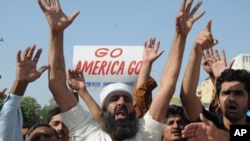The Taliban says it, not Pakistan, controls the Haqqani network, which U.S. officials blame for numerous attacks on American targets and have linked to Islamabad's intelligence agency.
A statement released on the Taliban's website (Voice of Jihad) said "all insurgent activity is of "our own initiatives and our own actions." It said there are no ties between the Haqqani network and Pakistan's spy agency, the ISI.
The statement also said attempts to link the Haqqani network's founder, Jalaluddin Haqqani, to the Pakistani government were an attempt to "give a bad name to our prominent figures" by tying them to foreign intelligence services.
Last week, the outgoing chairman of the U.S. Joint Chiefs of Staff, Admiral Mike Mullen, said that the Haqqani group was a "veritable arm" of the Pakistani spy agency, blaming its fighters for a deadly assalt on the U.S. Embassy in Kabul, as well as an attack on a NATO base in Afghanistan earlier this month.
Pakistan has repeatedly rejected the allegations.
U.S. officials have recently applied increasing diplomatic pressure on Pakistan to take military action against the group.
The Taliban has also denied American charges that Haqqani fighters are seeking refuge in Pakistan's North Waziristan tribal region that borders Afghanistan.
On Monday, Pakistani military officials said Islamabad has decided not to target the Haqqani network because its military is already stretched too thin battling other militants in northwest Pakistan.
In Washington Monday, State Department spokesman Mark Toner said the U.S. remains confident it can work constructively with the Pakistani authorities to address concerns about the terror group. He said Washington recognizes that the Haqqani network poses a clear threat to U.S. security in Afghanistan.
Meanwhile, Pakistan's army chief, Ashfaq Pervez Kayani, has canceled a visit to Britain during which he was scheduled to meet privately with Defense Minister Liam Fox. Prime Minister Yousuf Raza Gilani also called for a rare cross-party conference to be held on Thursday to form a united front in the face of the U.S. allegations leveled against the military and the ISI.
Gilani has condemned the allegations as a “propaganda blitz." He also asked Foreign Minister Hina Rabbani Khar, who is attending the U.N. General Assembly session in New York, to "forcefully present Pakistan's point of view" when she addresses the world leaders Tuesday.
Some information for this report was provided by AP and AFP.
















